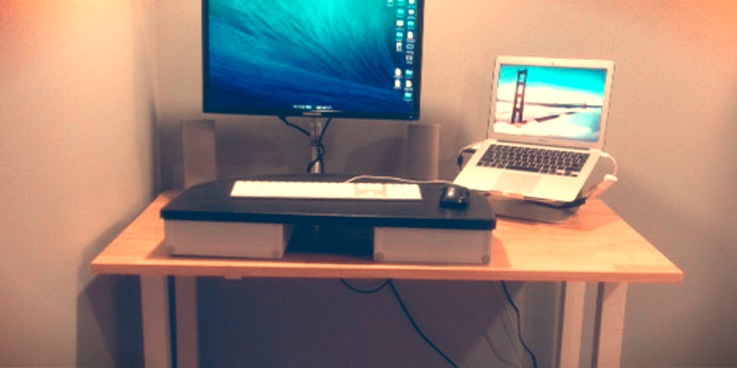
A bit of a disclaimer: I am writing this article from the angle of describing some habits that I’ve been incorporating into my routine that have made a positive difference in my productivity. As you read this it will appear that I am positioning myself as the “Highly Effective Desk Worker”, but I will be the first to admit that I have a long way to go before I am doing all of these consistently.
Habit 1: Get Up Early

I have a pretty busy life. With 4 children under 5 years old, and a wife who works in the evenings, when I’m not working at my day job, I’m changing diapers, fixing dinner, or cleaning up before my wife gets home, and I head to bed after a little bit of time together to discuss our day. I’ve tried staying up late to get more done, and when I was in my 20s, that was a pretty valid option. However, now that I’m in my 30s, it’s becoming pretty clear that staying up late does not equate to a very focused and productive next day.
For the past year, I’ve been trying to get up early and get more done. I’m not talking about more of my day job, but more so the other items that don’t find their way into my life any other way. Activities like working on my side-projects, reading articles, reading books, writing blog posts, organizing my day, taking a hike, etc. It is during this time that I accomplish most of the other things that I am writing about in this blog post. For me, “early” is typically 6:00. I’ve been toying with the idea of getting up even earlier to ensure that I get some more exercise time in, but that also means that I’d have to adjust my bedtime, which I’m trying to make 7 hours before my wake-time. So here is my ideal schedule:
- 06:00 – Wake Up/Get Ready
- 06:30 – Leave for Coffee Shop
- 06:45 – Begin Productive Time
- 07:45 – Head to Metropark to Hike (optional)
Depending upon how much productive time I need to set aside, I may or may not go to the Metropark, which is fortunately enough between my house and work. Now, to be honest, I don’t always stick to this schedule. Many times I stay in bed or put around the house as this time passes by. However, on those mornings that I do discipline myself to get out early, I feel great that I accomplished something so early, I make progress on projects that would otherwise stagnate, and I get a feeling that I’ve created time out of thin air since I wasn’t taking advantage of it previously. The key here is to make sure that I am getting around 7 hours of sleep to operate at my peak the next day. A major change is how much TV I’ve watched in the evenings. In general, television watching isn’t helping me become a better person, so I go to bed instead so I can wake up earlier!
Habit 2: Regularly Enjoy Nature

The Columbus Metropark system is great, in that there are well-marked trails that head through a variety of habitats (deciduous forest, coniferous forest, marshes, open prairie). These trails can be anything from 1 mile to 4 miles long round-trip, perfect for a quick morning outing. On mornings that I take time to hike, I not only get some much-needed exercise that my desk job doesn’t provide, but I get a chance to experience something beautiful that isn’t made out of pixels on my screen. It has 3-dimensions! It has smells, sounds, and a crunchy feeling under my feet when I walk on the gravel trails.
Spending time in nature is therapeutic to me since I spend more time staring at an LCD panel more hours than anything else in my life. These hikes also provide me with alone time to think. My day is mostly spent ‘doing’ work, but when I walk, I can entertain any thought that pops into my head, and a lot of time this is when I process the bigger things in life: my relationships, my health, my attitude and reactions, and the world around me.
Habit 3: Sit Less

I never thought I could use a standing desk. I am well over 200lbs, and I didn’t think that standing on my feet all day would be something that I would voluntarily sign up for. However, I cannot say enough about how much standing during the majority of the workday has made a difference in my energy levels, my focus, my productivity, and my mood. At a standing desk, my body is always shifting in subtle ways, and this constant movement has translated into increased focus, likely due to the increased blood flow. I also happen to be sporting headphones most of the time, and I must admit that sometimes my “standing” desk turns into more of a “dancing” desk. Even if it is for a brief moment in a song, my mood is lifted. My coworkers have even commented on how my mood is improved, with one stating “You’re like in your version of Disneyland over there.” My guess is not everybody will bust a move at their standing desks, as personalities will differ, but it is worth noting that a few notable folks in history preferred a standing desk:
- Benjamin Franklin
- Ernest Hemingway
- Leonardo da Vinci
- Thomas Jefferson
- Winston Churchill
Source: http://www.ivanwalsh.com/productivity/standing-desk-productive-gtd/
Habit 4: Embrace the Analog

I mentioned earlier that I spend the majority of my time staring at a digital screen. I listen to compressed digital music in my headphones. I watch digital television for entertainment. I read digital books to learn. There’s too much “digital” in our society to not make room for a little more of the “analog”. My creativity is sparked in the analog. Here are a few examples of analog activities that counter-act my increasingly digital life:
- Peruse a bookstore looking at book titles, sparking interest in a new subject to learn about.
- Practice an acoustic instrument.
- Build something out of wood.
- Journal with paper and pen.
- Practice drawing something.
- Rock climb.
- Grow and pick your own vegetables.
- Fix something on your car.
- Have a face-to-face conversation with someone instead of calling.
The list can go on. These experiences cannot be accurately duplicated on a screen, or through a digital processor. They remind us what the real world is like, and take us temporarily out of the Matrix.
Habit 5: Read Regularly

For me, this is the hardest of the seven habits to do regularly. Don’t get me wrong, I consume Internet content all day long, but most of it isn’t high-quality information. What I’d like to do more of is reading long-form, thought-out blog posts, business books, executive summaries, professional magazines, and journal articles. I come across these things from time to time, and if I am disciplined, I can forge through a book a few times a year. A good way to cultivate this habit is to come up with a reading schedule. Put it on the calendar. Most calendar applications (Google, iCal) allow you to create multiple calendars that you can show/hide. Create a calendar called “Reading” and schedule reading time and goal-setting for finishing books and just setting aside time for those articles you’ve bookmarked.
Habit 6: Write Regularly

Even without a regular reading schedule, we take in enough miscellaneous information throughout our day that writing some of it down can be very beneficial when it comes to processing and applying it to our lives. Writing can take the form of a personal journal, or perhaps the form of a blog. In the case of the latter, your writing can also have the benefit of inspiring or benefitting others.
For example, as a web programmer, I often come across challenges that I don’t immediately know the answer to. Through some Google searching and trial and error, I usually end up finding a solution. If I take the time to blog about what I have figured out how to do, then I come to find that others have the same problems too. Sometimes they find my articles via a search, and they save a little time. I know that I have personally benefitted from others who do the same.
Habit 7: Measure Progress

I’m not exactly sure where I first came across this, but many people have said that the formula for making a change is as follows:
- Assess the current situation.
- Come up with an actionable, measurable plan for change.
- Create accountability to stick to that plan.
- Review your progress.
In theory, it seems that we are only four steps away from making any change in our lives. In practice, I see the above steps as more of a circle that is always going round and round. Many times we don’t hit the mark exactly as we had hoped, or perhaps we fail miserably. Sometimes we think we’ve hit the target, but in reality, we just compromised. Even if we nailed our goal dead-on, we are quick to forget our victories, sometimes choosing to listen to the negative things we tell ourselves when a new challenge arises. In all of the above habits, I think each one would benefit from an honest assessment, written action plan, accountability partner, and scheduled review.
For example, one of the books that I know has reflected this pattern is Tim Ferris’ Four Hour Body. In the book, Ferris suggests not carrying around a photo of what you want to look like, but a photo of yourself as you currently are, or at your worst. Being honest about your current situation can often be a more powerful stimulant than a lofty goal.